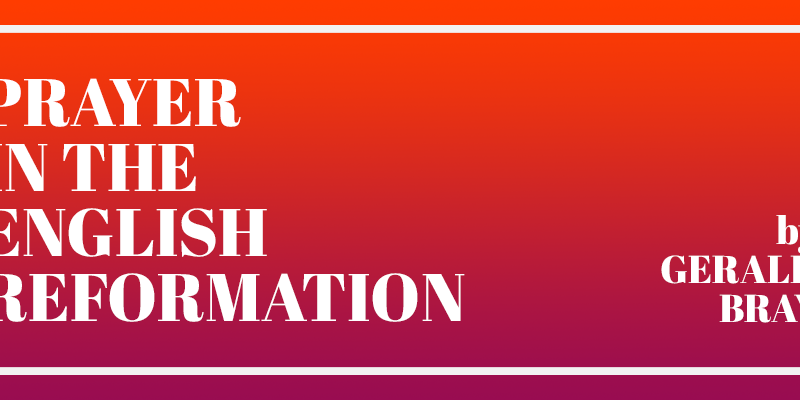
Prayer in the English Reformation (Gerald Bray)
In the most recent issue of Credo Magazine, “How Then Shall We Pray? The Necessity of Prayer for the Christian Life,” Gerald Bray has contributed two excellent articles on “Prayer in the English Reformation.” Gerald Bray is research professor of divinity, history, and doctrine at Beeson Divinity School. He is the author of numerous books, including God Has Spoken: A History of Christian Theology and God is Love: A Biblical and Systematic Theology.
 Here is the start of Bray’s article:
Here is the start of Bray’s article:
It may seem strange to think that arguments about prayer played a central role in the Protestant Reformation. We know that people did not have the Bible in their own language and that the institutional church suffered from defects that had to be put right, and we think that was what the Reformation was mainly about. Prayer, on the other hand, strikes us as having been much the same after the great upheaval of the sixteenth century as it had been before. It is hard to believe that people did not cry out to God before the Reformation, and since human needs do not change, it is equally hard to believe that their prayers did either. But prayer is at the heart of our devotional life as Christians, and because that devotional life was deeply affected by the movement of reform, questions surrounding the nature and practice of prayer were bound to be raised sooner or later.
Will you pray for me?
To understand what happened and why, we must step back into the medieval world in which Martin Luther grew up. The French historian Georges Duby (1919-96) classified medieval society into three distinct orders – those who prayed, those who fought and those who worked. These orders, better known to us as the three estates of the realm, were clearly demarcated from each other by a series of laws, customs and taboos that extended even to what each of them was allowed to wear. The praying order was the first, or spiritual estate, consisting of priests, monks, friars and other people who were officially recognized as “religious.” It was their duty to connect society to God, a task which was thought to be aided by imposing a semi-heavenly lifestyle on them. Like the angels, they were required to be celibate and they spoke, wrote and prayed in a language that was not in common use. They lived by their own laws, in their own quarters, and were as cut off from the world as they could be.
This way of life seems strange to us now, but it had a logic of its own. …
Read the rest of Bray’s article today!
We live in a world that screams to get our attention. From the moment you wake up to the second you hit your pillow at night, something or someone wants your time. Hosts of people are waiting for you to friend them on Facebook. The world awaits your next tweet and blog post. Your phone is buzzing because you have another email that needs your response. When you go home and turn on your TV there are innumerable “must see” shows, as well as breaking news you cannot afford to miss. Let’s face it, the world we live in is quite loud, and it never sleeps.
In the midst of all this noise, where does extended time in prayer fit in? Or does it? Prayer seems to run contrary to the busyness of life in the twenty-first century. If you don’t believe me, ask yourself this question, “When was the last time I spent more than 15 minutes in uninterrupted prayer with the Lord?” Church history shows that for Christians who came before us, private and corporate prayer was essential, assumed to be a necessary staple for the Christian and the church. After all, it is the God-given means by which we have fellowship and communion with God himself. Should we neglect prayer we actually neglect God, and the consequences are spiritually fatal. But should we set aside time to pray to God, we will benefit greatly, finding God to be a refuge and a shield in the midst of a chaotic, consuming, and demanding world.
In this issue of Credo Magazine we will focus on prayer, looking at how Christians in ages past have understood the importance of prayer, as well as Scripture’s own emphasis on the necessity of prayer. Not only will we recognize the importance of prayer, but in this issue we will look at how we pray as well. My guess is that most Christians have never even thought about how they should pray. Well here is a great opportunity to do so!
Contributors include: Gerald Bray, Aimee Byrd, Juan R. Sanchez, Peter Beck, Sandy Willson, Tim Keller, Sam Storms, Phil Johnson, Donald Whitney, Nancy Guthrie, among many others.

